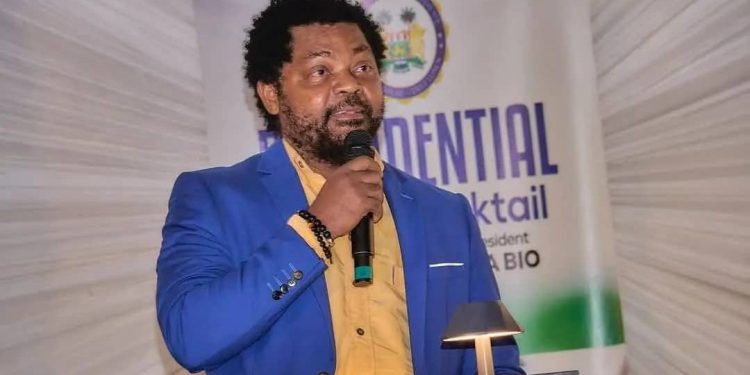By Mackie M. Jalloh
As the curtains draw on his tenure, the President of the Sierra Leone Association of Journalists (SLAJ), Ahmed Sahid Nasralla, delivered a heartfelt farewell address at the 2024 Presidential Media Cocktail. Standing before a gathering of media professionals, government officials, and development partners, Nasralla reflected on his six-year journey leading SLAJ, emphasizing the strides made in media freedom, the challenges still looming, and his hopes for the future of journalism in Sierra Leone.
“This is my final statement at this event as SLAJ President,” Nasralla began, his tone a blend of gratitude and resolve. “It has been a privilege to serve this association since 2019, working alongside the government, stakeholders, and our members to advance media freedom and professionalism. Together, we have achieved significant milestones; but our journey is far from complete.”
Under Nasralla’s leadership, SLAJ witnessed transformative developments in the media landscape. Key among these was the historic repeal of the criminal libel law in 2020, a promise fulfilled by President Julius Maada Bio’s administration. The law had stifled press freedom for over five decades; and its removal marked a turning point for journalists across the country. “Veteran journalists here can attest to the hardships endured under that oppressive law,” Nasralla remarked. “Its repeal signaled a new dawn for the press and laid the foundation for increased media development.”
In tandem with the repeal, the IMC Act 2020 mandated media employers to provide regular salaries above the minimum wage and contribute to social security for their staff. While the policy didn’t completely resolve journalists’ welfare issues, it represented a step toward addressing systemic challenges.
Other notable achievements included Sierra Leone’s improved ranking on the World Press Freedom Index, rising from 74th in 2023 to 64th in 2024, and the establishment of the National Fund for Public Interest Media (NaFPIM) to support investigative journalism.
Despite the successes, Nasralla acknowledged persistent challenges that undermine the media’s sustainability and independence. He highlighted the lingering impact of certain provisions in the Cyber Law, which threaten free expression, and the economic struggles faced by media houses, exacerbated by government debts for unpaid advertisements.
“No media outlet in Sierra Leone is breaking even,” he noted. “Advertising revenues have dwindled, production costs are rising, and the media is yet to recover from the shocks of the COVID-19 pandemic.”
Online harassment of journalists, especially women and independent reporters, also remains a pressing concern, with political supporters often perpetrating these attacks.
Nasralla lamented on the slow pace of government action on its financial commitments to NaFPIM and the construction of a SLAJ National Headquarters. He called for greater innovation within the media industry, urging stakeholders to embrace the digital space to overcome traditional limitations.
A Farewell with Gratitude and Optimism
As his tenure draws to a close in June 2025, Nasralla expressed deep appreciation for the collaborative efforts that defined his leadership. He commended President Bio’s administration for its support, including the annual subvention to SLAJ, which increased from 250 million to 750 million old Leones during his presidency.
He also highlighted the strides made in gender equality, media literacy, and the development of a National Blueprint for the media, while emphasizing the need for sustained advocacy and partnership to safeguard press freedom and professionalism.
“Through collaboration, mutual respect, and dialogue, we have achieved much,” he said. “I urge my successor and all stakeholders to build on this foundation and continue the fight for a more robust, independent, and professional media in Sierra Leone.”
In closing, Nasralla reiterated SLAJ’s unwavering commitment to the principles of Freedom of Expression and accountability journalism. He urged the government, civil society, and the private sector to remain steadfast in their support for the media as a cornerstone of democracy.
“It has been an honor to serve as SLAJ President during such a transformative period for our profession,” he concluded. “Together, we have proven that progress is possible. Let us continue this journey with courage and determination.”
As SLAJ prepares for new leadership in 2025, Nasralla’s legacy will serve as a reminder of what can be achieved through dedication, collaboration, and an unyielding commitment to the truth.










